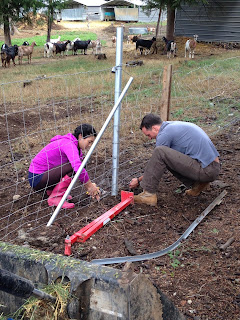Communications
 |
| Matthew Tuller and Rachael Taylor-Tuller kick off the farm walk on their goat dairy, Lost Peacock Creamery, in Thurston County. |
No wonder a recent farm walk at the Lost Peacock Creamery in Thurston County was a big draw. The walk’s title was “How not to start a goat dairy; Lessons learned and models for success from a veteran, female farmer.”
About 30 people attended. Most were small farmers and most were women. Some were exploring farming and raising goats. Some were military veterans or about to be honorably discharged from service. Others had links to food systems or sustainable farming organizations.
Rachael Taylor-Tuller and her husband, Matthew Tuller, led the tour of their Lost Peacock Creamery. While they shared insights about how they got into the business and currently manage their farm, the event was definitely interactive.
Along with asking questions, many on the tour offered advice and resources based on their own experiences. Everyone was learning and sharing. And that is the purpose of these Farm Walks, sponsored by Washington State University Food Systems and Tilth Alliance.
 |
| Farm walk attendees get up-close and personal with the goat herd. |
Goat yoga pays for feed
In just three years since they got their WSDA dairy license, Rachael and Matthew said Lost Peacock now provides them with a living wage without off-farm employment. Statewide, more than half of all farmers have a second job.
“It’s possible because we don’t live beyond our means,” Rachael said.
They have avoided taking on debt, she said, expanding as they had the resources. For instance, by adding one barn at a time as they could afford it.
They also rely on agritourism, including an interesting blend of fitness and farming that has been featured in the news.
“We do yoga every day, but I wasn’t sure if anyone would want to come to the farm to do yoga with goats,” she said. “But now goat yoga pays our feed bill.”
Another unique event on the farm is called “Cheese and Cuddles.” For $20, visitors can cuddle with the springtime baby goats and sample the farm’s cheese.
Their event space - decorated with goat art and featuring a climbing wall - is available to rent for birthday parties or other private occasions.
 |
| Mindy Ross enjoys some goat love. |
Marketing is key to success
Rachael is a natural and enthusiastic pitch person for her farm.
“The most important way to make a farm successful is with marketing,” she said. “You need to tell your story. Your farm has its story, and you have a personal story – your background, family, struggles -- that goes with that.”
Lost Peacock has a farm website, where Rachel regularly posts on a blog, and are active on social media.
Rachael shared with the group that she bought the farm after serving in the Air Force. When she got divorced, she had a young child and a fulltime corporate job, but she hung on to the farm determined to make it work. That’s the “how not to start a goat dairy” part of the story.
After meeting and marrying Matthew, Rachael’s dream started becoming reality. Now she had a partner who was as excited about building that farming dream as she was.
“Rachael is great at marketing,” Matthew said. “Farms make for great storytelling; there’s the cycle of birth, life, mating…” he trailed off as a male goat mounted a female in the background to illustrate.
Fences, feed, and people food
As the group watched our hosts and an able volunteer demonstrate a fence repair, the topic turned to feeding practices. We watched the goats nibble on tree bark as Matthew pointed out a lush green patch planted just for them.
 |
| Rachael and a volunteer demonstrate how to repair a bent fence. |
While they encourage natural foraging, Rachael said they also provide feed that does not contain any corn, soy or wheat, due to customers with allergies.
“We only sell what we want to feed our own family,” she said.
The whole afternoon was packed with practical tips about farming and goats, and with personal stories about the rewards and struggles of farming. The day wrapped up with samples of Lost Peacock goat cheeses.

So, what’s with the peacocks? Rachael and Matthew got married on the farm and she wanted peacocks for atmosphere. They got one pair and now several roam their property and perch on rooftops.
“Apparently, they really like it here,” she commented.
To learn more about their farm and their story, visit the Lost Peacock Creamery website (and read Rachael’s blog posts for their story) or follow them on social media.
